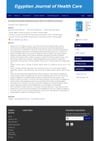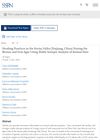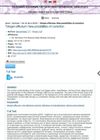 3 citations,
February 2013 in “Bangladesh Journal of Medicine”
3 citations,
February 2013 in “Bangladesh Journal of Medicine” Low iron levels are linked to hair loss in women.
 1 citations,
December 2023 in “Curēus”
1 citations,
December 2023 in “Curēus” Most children with a common hemochromatosis genotype had elevated iron levels but no severe symptoms.
 May 2022 in “Clinical Epigenetics”
May 2022 in “Clinical Epigenetics” A mother's iron levels early in pregnancy can influence the DNA makeup of her child, potentially affecting the child's health.
January 2019 in “Türkiye klinikleri dermatoloji dergisi” Low levels of iron, ferritin, zinc, and folic acid may contribute to hair loss in women.
 October 2022 in “Egyptian Journal of Health Care”
October 2022 in “Egyptian Journal of Health Care” Female nursing students with iron deficiency anemia have poor knowledge and practices regarding iron intake, needing better health education and physical monitoring.
 December 2023 in “Journal of biobased materials and bioenergy”
December 2023 in “Journal of biobased materials and bioenergy” The algae grew better and fixed nitrogen more efficiently when they worked together, using nitrogen and iron.
February 2023 in “El-Minia Medical Bulletin”  1 citations,
February 2024 in “Environmental health perspectives”
1 citations,
February 2024 in “Environmental health perspectives” Exposure to certain metals may worsen attention-related behaviors in adolescents, with stronger effects in females.

Ancient herders in the Keriya Valley fed their animals mainly C3 plants, with some C4 plant feeding possibly due to herd movement or seasonal changes.
 239 citations,
July 2002 in “Clinical and Experimental Dermatology”
239 citations,
July 2002 in “Clinical and Experimental Dermatology” Low iron and L-lysine levels can cause hair loss in women, and increasing these nutrients can reduce hair shedding.
 163 citations,
November 2003 in “Journal of Investigative Dermatology”
163 citations,
November 2003 in “Journal of Investigative Dermatology” Low iron levels may be linked to some types of hair loss in women.
 124 citations,
August 1990 in “British Journal of Dermatology”
124 citations,
August 1990 in “British Journal of Dermatology” Diffuse alopecia in women may be related to androgens and iron deficiency, and basic hormone and nutrient screening is useful.
 83 citations,
April 1992 in “Clinical Endocrinology”
83 citations,
April 1992 in “Clinical Endocrinology” Having enough iron improves the effectiveness of a specific hair loss treatment in women.
 83 citations,
November 2002 in “British Journal of Dermatology”
83 citations,
November 2002 in “British Journal of Dermatology” Low iron levels are not directly linked to chronic hair loss and iron supplements may not help.
 62 citations,
January 2013 in “Skin Pharmacology and Physiology”
62 citations,
January 2013 in “Skin Pharmacology and Physiology” Low iron and vitamin D levels are linked to hair loss in women.
 56 citations,
January 2008 in “Dermatology”
56 citations,
January 2008 in “Dermatology” Higher iron levels in the blood are not linked to increased hair loss in women.
45 citations,
August 2018 in “Haematologica” Macrophage iron release is crucial for hair growth and wound healing.
 25 citations,
January 2017 in “International Journal of Trichology”
25 citations,
January 2017 in “International Journal of Trichology” Most Indian people with hair loss in the study lacked nutrients, especially iron.
 19 citations,
January 2015 in “Journal of Clinical and Diagnostic Research”
19 citations,
January 2015 in “Journal of Clinical and Diagnostic Research” The main causes of diffuse hair loss in women are telogen effluvium and androgenetic alopecia, often related to stress and iron deficiency.
 11 citations,
January 2011 in “Turkish Journal of Medical Sciences”
11 citations,
January 2011 in “Turkish Journal of Medical Sciences” Low iron levels are a significant risk factor for hair loss, while high vitamin D levels might be a response to hair loss, not a cause.
 10 citations,
August 2021 in “Journal of Cosmetic Dermatology”
10 citations,
August 2021 in “Journal of Cosmetic Dermatology” Most patients with telogen effluvium had low iron and vitamin D levels; iron supplements were commonly prescribed.
 7 citations,
January 2017 in “Journal of Clinical Biochemistry and Nutrition”
7 citations,
January 2017 in “Journal of Clinical Biochemistry and Nutrition” Higher vitamin D levels are linked to higher iron levels in Korean women without metabolic syndrome, but not in those with it.
 6 citations,
October 2012 in “BMJ”
6 citations,
October 2012 in “BMJ” The woman's hair loss was mainly due to stress and low iron levels, and her hair grew back after treatment.
 4 citations,
June 2018 in “PLOS ONE”
4 citations,
June 2018 in “PLOS ONE” Iron levels are linked to insulin resistance in men and postmenopausal women, but not in premenopausal women.
 4 citations,
June 2016 in “Rossiiskii Zhurnal Kozhnykh i Venericheskikh Boleznei”
4 citations,
June 2016 in “Rossiiskii Zhurnal Kozhnykh i Venericheskikh Boleznei” Combining iron supplements with Qilib lotion is more effective for treating hair loss from iron deficiency.
 4 citations,
December 2014 in “European Journal of Chemistry”
4 citations,
December 2014 in “European Journal of Chemistry” Iron chloride helps create compounds that could be useful in medicine, like treating hair loss.
 3 citations,
January 2017 in “Journal of Pakistan Association of Dermatology”
3 citations,
January 2017 in “Journal of Pakistan Association of Dermatology” Women with certain types of hair loss may have low iron levels, and iron supplements could help.
 3 citations,
January 2017 in “Indian journal of health sciences and biomedical research KLEU”
3 citations,
January 2017 in “Indian journal of health sciences and biomedical research KLEU” Low iron levels are significantly linked to hair loss in women.
 2 citations,
July 2022 in “Dermatology practical & conceptual”
2 citations,
July 2022 in “Dermatology practical & conceptual” Iron deficiency anemia may contribute to hair loss in women with Telogen effluvium.
2 citations,
January 2015 in “Journal of Health Science” Iron deficiency is more common in women with excessive hair loss.


























